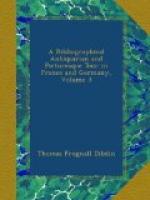Of female society I can absolutely say little or nothing. The upper circles of society are all broken up for the gaieties of Baden. Yet, at the opera, at the Prater, and in the streets, I should say that the general appearance and manners of the females are very interesting; strongly resembling, in the former respect, those of our own country. In the streets, and in the shops, the women wear their own hair, which is generally of a light brown colour, apparently well brushed and combed, platted and twisted into graceful forms. In complexion, they are generally fair, with blue eyes; and in stature they are usually short and stout. The men are, I think, every where good-natured, obliging, and extremely anxious to pay you every attention of which you stand in need. If I could but speak the language fluently, I should quickly fancy myself in England. The French language here is less useful than the Italian, in making yourself understood.
So much for the living, or active life. Let me now direct your attention to inanimate objects; and these will readily strike you as relating to Buildings—in their varied characters of houses, churches and palaces. First, of the STREETS. I told you, a little before, that there are upwards of one hundred and twenty palaces, so called, in Vienna; but the truth is, almost every street may be said to be filled with palaces: so large and lofty are the houses of which they are usually composed. Sometimes a street, of a tolerable length, will contain only a dozen houses—as, for instance, that of the Wallnerstrasse: at the further end of which, to the right, lives Mr.------ the second banker (Count Fries being the first) in Vienna. Some of the banking-houses have quite the air of noblemen’s chateaux. It is true, that these houses, like our Inns of Court, are inhabited by different families; yet the external appearance, being uniform, and frequently highly decorated, have an exceedingly picturesque appearance. The architectural ornaments, over the doors and windows—so miserably wanting in our principal streets and squares, and of which the absence gives to Portland Place the look, at a distance, of a range of barracks—are here, yet more than at Augsbourg or Munich, boldly and sometimes beautifully managed. The Palace of Prince Eugene[136] in the street in which I reside, and which no Englishman ought to gaze at without emotions of pleasure—is highly illustrative of the justice of the foregoing remark. This palace is now converted into the Mint. The door-ways and window-frames are, generally, throughout the streets of Vienna, of a bold and pleasing architectural character. From one till three, the usual hour of dining, the streets of Vienna are stripped of their full complement of population; but from three till six; at the latter of which hours the plays and opera begin, there is a numerous and animated population. Notwithstanding the season of the year, the days have been sometimes even sultry; while over head has constantly appeared one of the bluest and brightest skies ever viewed by human eyes.




